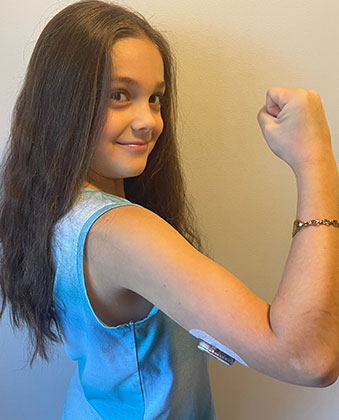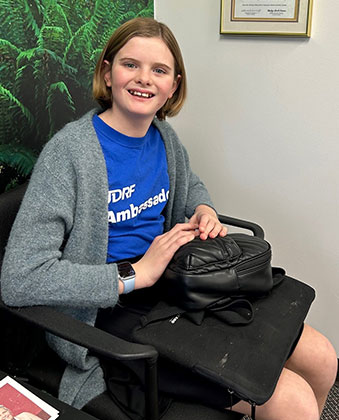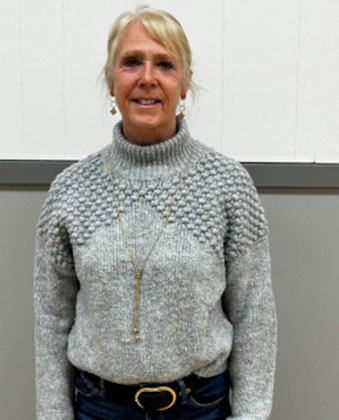JDRF’s Mental Health and Diabetes Strategy – where we are now
May is Mental Health Awareness month, a national movement to raise awareness of the importance of mental health, and the structural gaps that exist in accessing treatment and support.
There is no physical health without mental health. JDRF has long recognized the need to prioritize both – particularly as it relates to our mission to improve the lives of people living with type 1 diabetes (T1D).
T1D affects a person’s emotional, social, and mental wellbeing throughout their lifetime, known collectively as psychosocial health. Psychosocial health is directly related to physical health, and to health outcomes like glycemic control in T1D. JDRF’s Mental Health Strategy, launched in 2021, aims to better support this critical need that has long been underappreciated and undertreated in people with T1D.
T1D is a lifelong disease that involves constant blood glucose monitoring, counting carbs, fear of T1D related complications, and taking insulin every day just to stay alive. The stress around diabetes management can manifest in depression, anxiety, and “diabetes distress” – a term describing the powerlessness, stress, guilt, relentless worry and denial that accompanies living with diabetes and the burden of self-care.
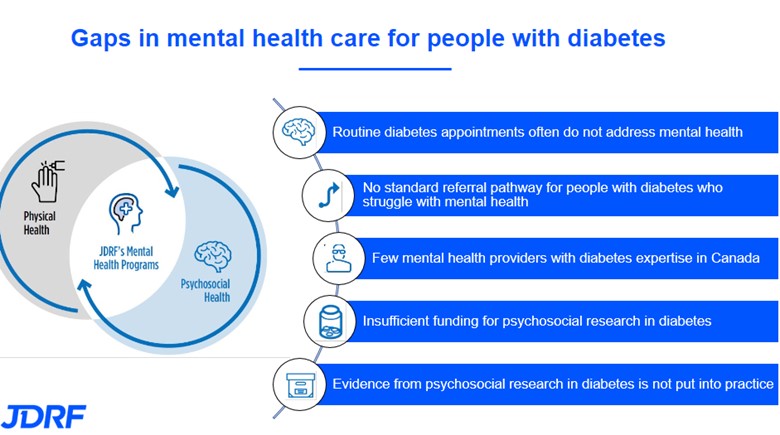
But for too long, healthcare practitioners almost exclusively focused on the physical aspects of T1D without addressing mental health. T1D can also be an isolating condition, and many living with it don’t have appropriate social or community support.
It is for this reason that JDRF Canada developed a three-pronged approach to its mental health strategy:
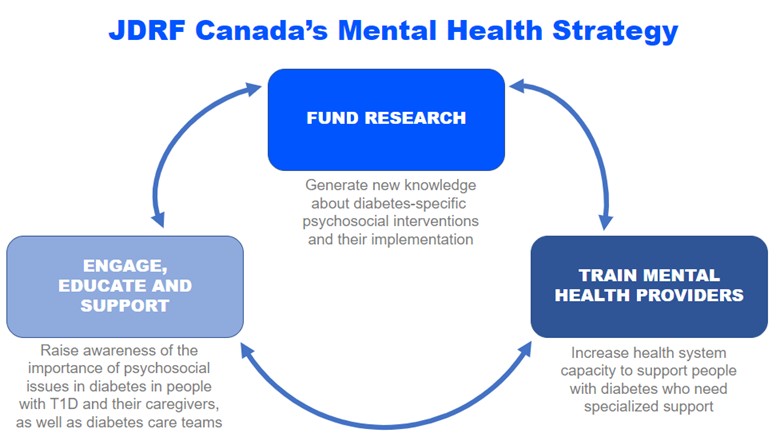
Why it matters so much:
I was diagnosed with type 1 diabetes when I was ten years old, and now I’m 19. Even after nine years of living with this disease, I still have daily challenges and struggles. However, I wouldn’t be who I am today without my battle with type 1. I just completed my first year at UBC to gain a bachelor’s degree in psychology. My dream is to become a psychologist for children with chronic illnesses. I believe my personal experience as a child with a chronic illness could benefit and support others in similar situations. I’m so thankful for the inspiring donors who support JDRF, which is working hard to find a cure for all of us affected by T1D. –Shay, diagnosed at age 10
Research Update
The Mental Health + Diabetes Training Program: Preparing a new generation of providers
Dr. Tricia Tang and her team at UBC will also evaluate our model to train the next generation of clinical counsellors, clinical psychologists, and social workers to connect with and work effectively with the diabetes patient population across Canada and to access and navigate the Mental Health + Diabetes Directory.
This study will help to understand the impact of the Mental Health + Diabetes Training Program by carefully compiling evidence-based outcomes and feedback from mental health providers and their patients.
JDRF Canada – Brain Canada Addressing Mental Health in Type 1 Diabetes Team Grants
A randomized controlled trial of the REACHOUT intervention
Dr. Tricia Tang, University of British Columbia (UBC)
Dr. Tang and her team at UBC are using a virtual care platform to deliver peer-led mental health support to adults and youth with T1D in rural BC through a mobile app called REACHOUT. After hosting focus groups last year, the team redesigned the REACHOUT app to better meet the needs of the community. More than 75 Peer Supporters (i.e., adults with type 1 diabetes trained to deliver mental health support to others with type 1 diabetes) were recruited to support the REACHOUT intervention.
Teaching adolescents with T1D self-compassion to reduce diabetes distress
Dr. Marie-Eve Robinson, Children’s Hospital of Eastern Ontario (CHEO)
Dr. Robinson and her team are testing the effectiveness of a mindful self-compassion program on improving diabetes distress, anxiety, depression, diabetes-related disordered eating, and suicidal ideation experienced by youth aged 12-17 years with T1D. The program focuses on teaching self-kindness, mindfulness, and the idea that negative experiences are not personal failures, but part of the common human experience. Study recruitment began in October 2022 and was completed in March 2023, with 141 participants enrolling. The first results are expected in June 2024. The study methodology was published in JMIR Research Protocols.
Technology-enabled comprehensive care for young adults experiencing diabetes distress
Dr. Peter Selby, The Centre for Addiction and Mental Health (CAMH)
Dr. Selby and his team are bringing experts in mental health and T1D care together with those who have lived experience of T1D to co-develop a tech-based solution for diabetes distress for adults between the ages of 18 and 29, a group disproportionately vulnerable to diabetes distress.
JDRF-CIHR Mental Health Grants
Supporting youth with T1D during transition from pediatric to adult diabetes care
Dr. Sonia Butalia, University of Calgary
Dr. Butalia and her team are researching the transition from pediatric to adult diabetes care – a crucial and tenuous time for many living with T1D. Dr. Butalia completed a successful pilot intervention that supports teens through texts, emails, phone calls, and social media groups, which saw improved blood glucose levels among those involved in the program. Currently, she is expanding the program to five sites in Alberta and evaluating its impact on participants’ mental health and diabetes management. Her team is also designing a free toolkit for other locations to implement the program.
Adaptation and pilot evaluation of a digital intervention before and during pregnancy
Dr. Deborah Da Costa, McGill University
Diabetes-specific distress and poor mental health during the preconception and pregnancy period can adversely impact mother and baby health, yet research in this field has not been prioritized, and limited interventions exist. Dr. Da Costa and her team previously developed a successful digital intervention for pregnant, birthing, and postpartum women. They will now use the JDRF-CIHR grant to collaborate with diabetes experts – primarily those living with T1D and T2D – to adapt their platform for women with pregestational diabetes.
Peer mentorship to increase physical activity and quality of life in adolescents with T1D
Dr. Jonathan McGavock, University of Manitoba
Though physical activity is a crucial component of T1D management, essential for optimal quality of life, and a significant factor in mental health, daily physical activity levels remain low in adolescents with T1D. Dr. McGavock and his team are conducting a 12-week program of group-based exercise led by mentors with T1D living healthy, active lifestyles. This program will seek to impart to the participants a sense of mastery, relatedness, and connection with peers, and a sense of autonomy to improve their quality of life through healthy, active lifestyles.
Find Your CommuniT1D: Customized Virtual Peer Support for People Living with T1D
Dr. Holly Witteman, Université Laval
Dr. Witteman and her team are creating a virtual peer support program and community led by people with T1D and with support from research team members who bring expertise in mental health, diabetes care, psychology, and social support. This program will consist of small group meetings intended to connect people with T1D and their caregivers based on their individual characteristics, hobbies, interests, language requirements, etc., while continuously adapting to the community’s needs. The research focuses on the feasibility and acceptability of the program as well as its impact on diabetes distress, quality of life, well-being, diabetes management, and use of resources.
Training Mental Health Providers
JDRF Canada and Diabetes Canada collaborated to launch the Mental Health + Diabetes Training Program in English and French in March 2023. The course consists of two streams: one for mental health providers in Canada – including registered psychologists, clinical counsellors, psychotherapists, social workers, psychiatrists, and mental health nurses – and one for the diabetes community and healthcare providers, caregivers, family members, friends, and anyone who wishes to take the general stream of the course.
Despite the large number of people living with the condition, only a handful of mental health providers in Canada have in depth knowledge of the unique psychosocial challenges that come with living with diabetes. The goal of the Mental Health + Diabetes Training Program is to prepare mental health providers to have sufficient knowledge and skills to assess and treat their patients living with type 1 or type 2 diabetes.

Training Program and Directory Stats
(as of April 2024)
- 557 mental health providers enrolled in the program
- 873 others (people with T1D, family members, etc.) enrolled in the program
- 124 mental health providers approved to be listed in the directory
- Approved as a sponsor of continuing education for psychologists by the Canadian Psychological Association, valid for 10 credits
- Approved by the Order of Social Workers, Family, and Marriage Therapists of Quebec (Ordre des travailleurs sociaux et des thérapeutes conjugaux et familiaux du Québec) and the Ordre des Psychologues du Québec to provide continuing education to their members
As a contributor to JDRF’s Mental Health + Diabetes Training Program, Lujane shared experiences that impacted her mental health, which highlight gaps in care:
“One night, I was experiencing some troubling symptoms with my T1D and called the endocrinologist on-call at the hospital to ask what I should do. He immediately advised me to go to the hospital. When I went in, the ER doctor looked agitated and tired and questioned why I even came that night. This experience was both positive and negative. I had one physician who cared for my health and listened, and I had another physician who didn’t listen and who made me feel shame.
There is a disconnect in the healthcare system, and people with diabetes often fall between the cracks by being told to take their health seriously and having the onus put on them to make good choices, but at the same time, not having that seriousness and care shown to them. Experiencing this disconnect, on top-of the 24/7 self-management of T1D and fear of complications, takes a toll on your mental health.” –Lujane, diagnosed at age 18
Mental Health + Diabetes Directory
Mental health providers who complete the Training Program can apply to be listed in our bilingual, publicly accessible Mental Health + Diabetes Directory, allowing healthcare providers and people living with diabetes to be referred or self-refer to trained providers who can offer specialized support to youth and adults living with diabetes.
As of April 2024, 124 mental health providers are accepting new clients via our Mental Health + Diabetes Directory across Canada, including Vancouver-based Clinical Counsellor Shalet Rosario, who shares:
“I’ve walked the path of type 1 diabetes since I was 12 years old, and I intimately understand the ups and downs that come with it. I’ve faced the unique challenges and triumphs of this journey, and I’m here to lend an understanding ear and a helping hand to individuals, couples, and families affected by diabetes and who grapple with diabetes-related burnout, psychological trauma, depression, and anxiety.”
Engagement, Education and Support
Our mental health strategy’s engagement, education and support activities focus on health care providers as well as people who live with T1D and their families and caregivers.
Donor funding helps us produce new educational materials for healthcare providers and the T1D community that cover the mental health aspects of diabetes. These include electronic briefs, webinars and events, a dedicated hub on our website, and promotion of the Mental Health + Diabetes Directory among healthcare providers as a referral source for their patients.
Let’s Talk T1D Education Series
A Let’s Talk T1D Education Series webinar on mental health was held in English and French in May 2023 with the aim that it become an annual event to promote Mental Health Awareness Month. There is a second Education Series on Diabetes and Mental Health featuring mental health providers that specialize in diabetes with Dr. Michael Vallis and Zosia Anders, taking place on May 30, 2024, along with future plans for a webinar on disordered eating and T1D.

Raising Awareness about T1D and
Disordered Eating
In December 2023, we co-hosted a webinar about T1D and Disordered Eating in partnership with the National Eating Disorder Information Centre (NEDIC). More than 500 healthcare providers nationwide and beyond signed up for the English webinar and 80 for the French webinar, highlighting the gaps in knowledge that exist among healthcare providers.
Aude Bandini bravely shared her experience with T1D and bulimia. She went into diabetes ketoacidosis (DKA, a potential life-threatening condition when blood glucose levels are dangerously high) when she was 17, and it wasn’t until age 36 that she noticed her healthcare professionals were finally starting to acknowledge the mental health impacts of T1D.
“Most of the time, I left the physician’s office crying,” Aude shared. “With my diabetes team, the approach was exclusively focused on numbers and glycemic control. I think they thought that through punishment and threats and guilt, I would behave, and of course, it did not work that way.”
Mental Health and T1D Community Grants
As part of JDRF Canada’s Mental Health Strategy for T1D and a key fundraising pillar of the $100M Campaign to Accelerate, in May 2023 we opened the JDRF Canada Mental Health and T1D Community Grants Program as a new funding opportunity. This incubator initiative is designed to provide seed funding to organizations ready to transform innovative ideas into successful projects to support the mental health and wellness of the T1D community.
Each project was awarded up to $20,000 and will be up to 18 months long, supporting:
- The addition of mental health content to established programming for adults with T1D
- A virtual mental health training program in Edmonton for people living with T1D
- A bilingual webcomic focused on psychosocial issues for children aged 7-12 newly diagnosed with T1D
- A French video series that educates and combats stigma around mental health and T1D
- In-person programming for people with T1D of all ages at a busy community health centre
Partnerships are a crucial component of JDRF Canada’s Mental Health Strategy, and we are proud to be partnering with a variety of organizations across Canada to support these new community projects and expand the capacity and diversity of supports for mental health and well-being in the T1D community. Read more about the projects here: https://jdrf.ca/jdrf-canada-announces-new-projects-supported-by-the-mental-health-and-t1d-community-grants/
What’s next?
With our Mental Health Advisory Council’s input, we will continue to expand our mental health website content, build awareness of our Mental Health + Diabetes Directory so individuals feel empowered to self-refer, and develop new approaches to further educate and connect the community.
JDRF Canada extends our gratitude for the support of our Advisory Council, Cabinet Members and philanthropic partners, including charitable partners Brain Canada and Diabetes Canada.
New funding investments and partnerships are still needed as we go forward. For more information, please email Jen Bavli at jbavli@jdrf.ca.
Looking for more information on available mental health support? Visit our Mental Health + Diabetes Directory to connect with a mental health provider or visit our website for more information.







